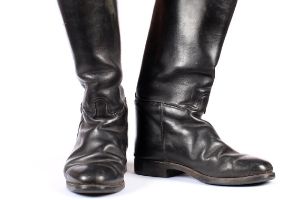Another brilliant piece from a GUNNAS WRITING MASTERCLASS WRITER.
The first time I was photographed with the boots I knew they were way too big. I stood next to them and they were as tall as me. The photo showed the Valley in the background and those giant boots diminished me. Had I ever been that small? As a young boy I longed to grow up, to be tall enough, so that I could wear those boots. I hungered for the time when I could stride across the Valley in those boots. To be able to be tall enough to wear the boots, rather than stand inside them, or be overwhelmed by them.
They were black and shiny, made of fine grain leather. The boot-maker had crafted them for my great uncle on request. They fitted him perfectly. He wore them walking through the Valley as he went about his work. But he had left them when he went off to France…and he never came back for them. He died over there, before I was born, but I seemed to always know the journey of the boots and their wearer. The boots were worn in, but well cared for. The leather shiny and supple, the soles worn but not shabby, evidence of having been reshod, all scuff marks polished away. They usually stayed in the cupboard under the stairs, in a box that seemed to have been made especially for them. Awaiting the return of the owner to once again place them on the floorboards, sit on the box beside the hearth and don them to walk into another ordinary day, walking.
A dog barked in the Valley below distracting me from my reverie of the photo. That dog was one of the progeny of my great uncle’s dog. A farm dog and a true companion to me. A border collie, breathtakingly black with one white star on the forehead. Fiercely loyal and constant, perennially gentle. We had walked through the Valley together on many days. Checking this, fixing that, tending to that animal in need, ensuring this fence was repaired and then returning to the cottage at the end of the day.
My great uncle’s dog was gentle too. Whenever the boots came out and were placed beside the hearth, it was if she could sense my great uncle nearby. Her ears would prick up and she would almost stand to attention, waiting. Perhaps it was the smell of the leather, that still contained some essence of my great uncle, perhaps it was the sound of them being placed on the wooden floor, as if in readiness to be donned then off for the walk, striding through the Valley, the pair of them side by side, on their daily journey of repairs and tending.
The old dog would bark in anticipation and my grandmother would shush her. Firmly imploring the dog to settle. Her eyes glistening with the memory of her brother. She knew about loss. She knew about waiting. She knew about remembering. She knew the dog missed the man and that the wait had been too long for that loyal companion. I remember sometimes wondering why my grandmother seemed so sad each time the boots were taken out and then later in the day put away. It only seemed to happen once or twice a year. I didn’t understand then. But in time to come understanding would seep into my consciousness and I would be aware of the loss and the need to remember.
I recognized that memory and loss go together. That loss of a person is found in memory. That in memory the loss can be acute. The recollection can bring tears to the eye, tears of sadness and tears of loss for what could have been. But that bittersweet moment of recollection, while creating certainty that it can never be a newly formed event, still allows for the mind to play out the scene. And so it was for my grandmother whose memory would be tweaked by sound or smell, by bark of dog or scent of leather. The remembering of her brother with the placing of the boots by the hearth was enough to honour him, to remember the man.
As a child I would smell the leather, that heady musty smell, but it held no memory of my great uncle for me. In time to come I would understand that they were his boots. He had worn them in. Worn them while striding across the Valley. And that photo would trigger memories of my grandmother, as I gazed at myself standing there next to the boots once again. And then the smell of those boots would conjure up, not a man gone off to war and not returned, but my grandmother’s kitchen, a place of roast dinners and scones, of marmalade and jam tarts, of lemon curd and the best roast potatoes you have ever had.
Until finally I was old enough to pull all those threads of the story together, to collect the memories of smells and sounds and objects and faces. Then I could understand the import of that photo. It was like William standing in his boots next to his namesake.












